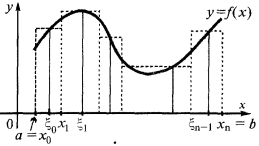Definition:If a function  defined on an interval
defined on an interval  and
and  then a definite integral of a function
then a definite integral of a function  on an interval
on an interval  is a number equal to limit of integral sum
is a number equal to limit of integral sum  where
where  f
f 
that is

where  i
i 
The construction of integral sums for the example of determining the area of the curvilinear trapezoid
Let on the segment  is set to an integral and continuous function
is set to an integral and continuous function 

To determine the area of the curvilinear trapezoid (bounded curve  axis
axis  and straight,
and straight,  and
and  ), divide the cut
), divide the cut  points
points 
on the  parts selected on each of the obtained partial segments
parts selected on each of the obtained partial segments  of an arbitrary point of the
of an arbitrary point of the  calculated values
calculated values of the function
of the function  at these points and form the sum
at these points and form the sum  where
where 
This amount is equal to the sum of the areas of the shaded rectangles is called the integral sum.
If now the number of dividing points increases indefinitely, and the length max (highest) partial cut partitioning tends to zero, and the value  tends to a certain limit
tends to a certain limit  does not depend on the method of division
does not depend on the method of division  and the choice of points
and the choice of points  on partial segments, then the value
on partial segments, then the value  is called the area of the curvilinear trapezoid, i.e.
is called the area of the curvilinear trapezoid, i.e. 
The Formula Newton - Leibniz
If the function is  defined and continuous on the interval
defined and continuous on the interval  and
and  is its integral (i.e.
is its integral (i.e.  ), then
), then 
Example. As  one of the primitive
one of the primitive  then
then 
The basic properties of the definite integral




- If
 integrated on
integrated on  and
and  then
then






 then
then